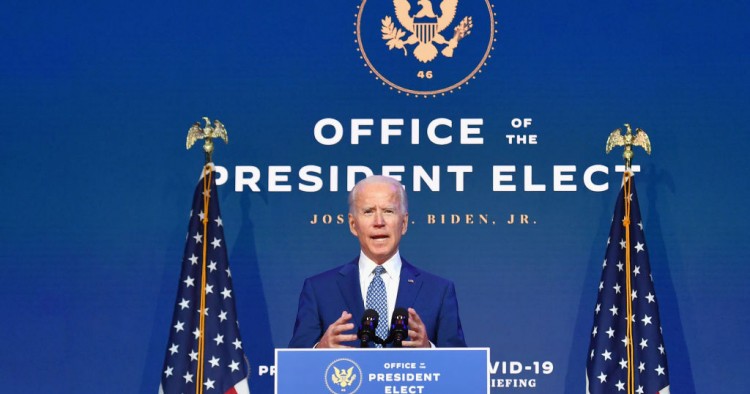This week's briefing on recent news and upcoming events in the region featuring Paul Salem, Alex Vatanka, Gonul Tol, Gerald Feierstein, Randa Slim, Khaled Elgindy, Charles Lister, Mirette F. Mabrouk, and Marvin G. Weinbaum.
The reverberations of the US election in the Middle East
Paul Salem
President

The U.S. election that took place last week has multiple reverberations in the Middle East. At a broad level it brings to the fore again — to a region where the people have little voice in the selection or replacement of their leaders — the power of the democratic system. To remove a leader, you don’t have to protest for years, stage a revolution, or plunge the country into civil war, but merely take a few minutes to show up at your local high school or library and indicate your wish. While many in the Middle East have long railed against U.S. foreign policy choices, they have generally been impressed, and in many cases inspired, by the workings of U.S. democracy.
The election also demonstrates the importance of a strong and independent judiciary that can act as a bulwark against the efforts of a chief executive who wants to bend the courts — and the outcome of an election — to his favor. While an authoritarian China and Russia resurge as global powers and as models of governance, it is important that the American democratic model — despite its many faults — is restored as an option as well. The struggle in the Middle East between three basic models of governance — authoritarian, Islamist, and democratic — will continue in the years ahead.
In foreign policy terms, much will still depend on the outcome of unconcluded Senate races. If the Republicans retain control of the Senate, a President Joe Biden will have to find common ground with the Republican leadership in order to be able to govern effectively. That would mean a more centrist domestic and foreign policy, leaving the left wing of the Democratic Party somewhat marginalized. If the Democrats gain control, his administration would more fully represent the current center-left spread of the party.
Biden is well known to the leaders of the region, but many of them openly supported Trump. It will be interesting to see how both sides deal with the important personal relations that undergird international relations. It will also be important to see who Biden chooses as secretaries of State, Defense, and Treasury, and how they manage relations with leaders in the region. Biden will also bring the issues of human rights, civil society, and good or democratic governance back into American conversations in the region. After four years of these issues being off the table, what effect will this have?
Biden will assume power as the U.S. is going through the worst pandemic in a century and the worst economic contraction since the 1930s. His priorities will be overwhelmingly domestic. And his foreign policy priorities are focused on global goals such as fighting the pandemic, returning to the climate accords, restoring alliances in Europe and Asia, and dealing with great power adversaries: China and Russia. In the campaign’s published program, the Middle East figures dead last in the listing. The main change in a Biden foreign policy is likely to be limited to Iran, although even there, a restoration of the status quo ante and finding a better path forward might be harder than imagined. There will be much to observe and assess in the weeks and months ahead. Leaders — and populations — in the Middle East will continue to watch with interest.
Joy at Trump’s defeat but little sign of a change in course in Tehran
Alex Vatanka
Director of Iran Program and Senior Fellow, Frontier Europe Initiative

In Tehran, the joy in seeing Donald Trump defeated in his re-election bid is crystal clear. What is also clear is that Tehran has yet to come up with a robust strategy to turn Joe Biden’s election as the 46th president of the United States into a moment to fundamentally steer U.S.-Iran relations in a different direction. That strategy might quietly be in the making or it might not at all be under consideration. Still, if Tehran is readying itself for a “grand bargain” with Washington under Biden, it is not showing. The initial reaction from the hardline faction that handles Tehran’s key foreign relations, namely Supreme Leader Ayatollah Ali Khamenei and the Revolutionary Guards, has been one of contempt not just for Trump but for the American government. That happens to be the same government that Biden will take charge of on Jan. 20.
Put simply, the hardliners’ message is that U.S. hostility toward the Islamic Republic is a fixed feature regardless of who is in the White House. The reality is the reverse. It is the hardline camp in Tehran that would be thunderstruck if it one day had to give up on anti-Americanism as a principal pillar of its worldview. That’s why the hardliners are already erecting barriers to a meaningful dialogue with Washington. Meanwhile, the so-called moderate wing of the regime clustered around President Hassan Rouhani cannot make a meaningful outreach to President-elect Biden without buy-in from Khamenei and the Revolutionary Guards. But at least the moderate faction goes through the trouble of showing a possible path for negotiations. What Rouhani and his team are asking for is a return by the U.S. to the 2015 nuclear deal and the removal of sanctions. In turn, Tehran will once again put a cap on its nuclear activities. Rouhani has also asked for compensation and an apology from Washington for Trump’s “maximum pressure” campaign, but that’s just tough public talk to protect himself from his hardline rivals in Tehran.
Rouhani has about six months left in office and his entire political legacy is tied to how much of the 2015 nuclear deal he can salvage between the time Biden arrives at the White House in January and Iran’s presidential elections in June 2021. Figures close to Rouhani readily admit that not only détente with the U.S. but also rehabilitation of the badly hurting Iranian economy requires Tehran to make major adjustments in the realm of economic policy (such as ratifying international financial standards) as well as contemplating negotiating with Washington about Iranian policies in the Middle East. But the general consensus in Tehran is that the prerequisite for U.S.-Iran talks to be broadened to include Iran’s regional actions is a successful return by both sides to the 2015 deal. That all said, the sad reality is that the American question is a political football in Tehran. The hardline camp, which is far more powerful, still believes anti-Americanism serves its narrow political interests at home and its militant Islamist ambitions in the Middle East. There likely will be some limited new talks between the Biden White House and Tehran but there is no evidence that Ayatollah Khamenei and the Revolutionary Guards intend to shift course in a major way as far the United States is concerned.
A new president and a different approach to Turkey
Gonul Tol
Director of Turkey Program and Senior Fellow, Frontier Europe Initiative

A stream of world leaders congratulated President-elect Joe Biden and Vice President-elect Kamala Harris on their victory in the 2020 U.S. presidential election after the TV networks called Pennsylvania for Biden on Saturday. Many even struck a jubilant tone. Not Turkish President Recep Tayyip Erdogan. He has remained silent, even as Turkey's Foreign Ministry released a statement on Sunday congratulating the winner of a presidential election — in Guinea. While Turkish Vice-President Fuat Oktay adopted an upbeat tone, saying Turkey-U.S. ties would not change under a Biden presidency, given how President Donald Trump has shielded Erdogan, whom he has called a personal friend and “a tough guy,” throughout his presidency, that statement sounds too optimistic, at least in the short term.
The two issues that will remind Erdogan that there is a new occupant in the White House are the case against Turkish state-owned bank Halkbank and the S-400 missile system Turkey purchased from Russia. U.S. prosecutors launched an investigation into Halkbank, which threatened both the bank and potentially Erdogan’s family. The prosecutors accused Halkbank of using front companies in Iran, Turkey, and the United Arab Emirates to evade Iran sanctions and of helping Iran secretly transfer billions of dollars in restricted funds. Erdogan used his close relations with Trump to pressure him to quash the investigation. A newly released New York Times story shows how hard the Justice Department under Trump tried to please Erdogan. We will see none of that under a Biden presidency. President Biden will remind Erdogan what he said four years ago when he was the vice-president and Erdogan approached him with a similar demand: that there was rule of law and a separation of powers in this country.
A Biden presidency will take a different approach to Turkey’s S-400 decision as well. Trump refused to impose sanctions on Turkey for the decision despite numerous calls from a bi-partisan group of lawmakers in Congress. Confident in Trump, Turkey recently tested the S-400s and Erdogan brushed off American criticism, saying, “We are not going to ask America.” At a time when Biden will struggle to find common ground with a potentially Republican-dominated Senate, punishing Erdogan for the S-400 would be an easy way to build bridges across the aisle.
All this is not to suggest that a “reset in bilateral relations” some in Washington and Ankara have been proposing is impossible, just that it will take a lot more concessions from Erdogan to bring it about.
Gulf reaction: Muted Saudi response signals rough road ahead
Gerald Feierstein
Senior Vice President

For the most part, reaction in Gulf capitals to news of President-elect Joe Biden’s victory echoed the congratulatory messages from allies and partners around the world. Notably, both the UAE’s Mohammed bin Zayed and Bahrain’s King Hamad were among the first to welcome the Biden election despite some presumable misgivings. Relations with Manama at the end of the Obama administration were particularly strained over human rights concerns, and Bahraini trepidation over a potential return to that unhappy past might be expected.
In that context, the long Saudi delay in adding its congratulations on the Biden victory signals Saudi unease over the implications for the future of the bilateral relationship. Despite the long and generally constructive partnership binding Washington and Riyadh, which largely continued over the course of the Obama administration, there are cracks in the relationship that threaten to deepen over the coming years. Iran policy is a potential area of intensifying disagreement, although not necessarily as problematic as other issues. While the Biden team has been clear that they would like to re-engage on the Iran nuclear deal, they have also been clear that they would seek adjustments that might suit Saudi interests, including on ballistic missiles. Moreover, the likelihood of a divided U.S. government might also limit the extent to which the Biden administration can retreat from President Donald Trump’s “maximum pressure” campaign.
The more likely points of bilateral friction focus on Saudi domestic issues, especially human rights concerns, and Yemen. The new administration is almost certain to prioritize ending the Yemen conflict. While the Saudis also favor an end to the conflict, they will be wary of an outcome, which Washington may find less problematic, that would leave pro-Iranian Yemeni elements in a position potentially to threaten Saudi security. The president-elect was also clear in the campaign that his administration would press Riyadh for accountability on the murder of journalist Jamal Khashoggi and critique Saudi human rights policies, especially in regard to arrests of women and civil rights activists. For four years, the Saudi leadership has relied on its warm relations with the Trump administration, particularly senior adviser Jared Kushner, to insulate itself from paying any penalties for its problematic domestic practices. But turning up the heat on Riyadh’s human rights record may be one area where the Biden administration can enjoy bipartisan congressional support. Thus, while the Biden administration can be expected to seek to preserve ties to Riyadh, the potential for more difficult conversations, and some U.S. retrenchment, is real.
Iraq is unlikely to be a focus, but should benefit from US-Iran de-escalation
Randa Slim
Senior Fellow, Director of Conflict Resolution and Track II Dialogues program

Given the limited bandwidth of a Biden administration dealing with a host of domestic priorities from the COVID-19 pandemic and economic recovery to racial inequities, foreign policy in general will be less of a priority and the Middle East in particular will be accorded the lowest priority on the administration’s agenda. On July 9, Anthony Blinken, Biden’s senior foreign policy adviser, said during a conversation at the Hudson Institute, “Just as a matter of time allocation and budget priorities, I think we would be doing less not more in the Middle East.”
Similar to the Trump administration, a Biden administration will not have an Iraq policy. Iraq will be viewed through the administration’s two principal priorities in the Middle East: Returning to a negotiation path with Iran and ending forever wars. The first priority is mainly about salvaging the 2015 nuclear deal the Obama-Biden administration struck with Iran, while the second concerns a policy issue that has long been the subject of debate between the Democratic Party’s moderate/centrist and progressive wings and now enjoys wide consensus among Democrats.
Iran’s nuclear program has been and remains a fundamental threat to U.S. interests in the Middle East. If Iran were to come back into compliance with its commitments — partial or full compliance is still a debated issue inside the Biden team — the administration would rejoin the 2015 nuclear deal and use it as a platform to push for negotiations with Tehran through a multilateral process to strengthen the nuclear deal and address other non-nuclear issues, including Iran’s ballistic missile program and regional policies. Tehran has indicated it is interested in discussing the nuclear file only. The question is how much time and resources a Biden administration would be willing to devote to pushing back against Iran’s non-nuclear activities if its priority objective, a strengthened nuclear deal, is achieved. And it is on these non-nuclear activities that Iraq and other countries in the Middle East need U.S. support most.
De-escalation of tensions between Iran and the U.S. will have a positive impact on security conditions in Iraq by ending the tit-for-tat escalation that has been taking place in Iraq between the two countries and for which Iraq and Iraqis have been paying the price. Gone is the U.S. threat to close its embassy in Baghdad. Diplomacy and development, not sanctions, threats, and use of force, will be the preferred tools for a Biden administration to pursue its foreign policy agenda. Simultaneously, the Iraqi government should not expect a Biden administration to prioritize the issue of reining in Iranian-funded militias and reducing Iranian influence in Iraqi affairs. Nor will Tehran be willing to negotiate the future of these militias in talks with the U.S. and its allies. It sees them as its insurance policy against Iraq ever again becoming a threat to its territory. Instead, we can expect the Biden administration to look at the challenge of reducing Iranian influence in Iraq as part of a long-game strategy the U.S. must pursue vis-à-vis Iran — a strategy that would prioritize diplomatic, economic, and cultural relations and development and humanitarian assistance.
Ending forever wars will translate into a reduction of the current U.S. force level in Iraq. The U.S.-Iraq Strategic Dialogue provides a vehicle through which the Biden administration can and will pursue a new framework for a reduced U.S. force presence to work in cooperation with the Iraqi government on counter-terrorism operations and training, advising, and equipping Iraqi security forces. Last week’s ISIS attack on tribal Hashed forces stationed at al-Radwaniyah on the southern outskirts of the Iraqi capital should serve as a stark reminder to the incoming administration that the fight against ISIS is not finished — a fight which VP Biden and his advisers were tasked to lead during the Obama administration. Iraq is a foreign policy issue President-elect Biden knows well and where we can expect him to lead on if and when needed.
Iraq’s accelerating economic crisis will in the near future force the new U.S. administration to devote greater time and attention to it. Expect a Biden administration to use its leverage in the international donor community to assist Iraq in accessing funding conditional on the Iraqi executive and legislative authorities enacting fundamental economic reforms as stated in the government’s recently-released white paper.
Safeguarding human rights and guaranteeing people’s right to protest and express their opinions free of persecution by their governments and security agencies will be a high priority for the Biden administration across the world and particularly in the Middle East. We will likely see more assistance for U.S. civil society organizations working with Iraqi protesters to fight corruption and promote accountability and good governance.
The Biden administration will also pay more attention to the issue of internal displacement in Iraq, working with partners in Europe and the region to promote durable solutions to this ongoing challenge.
Biden on Israel/Palestine: “Obama minus”
Khaled Elgindy
Senior Fellow, Director of Program on Palestine and Palestinian-Israeli Affairs

Former Vice President Joe Biden’s victory over Donald Trump is sure to elicit diametrically opposed reactions from Israelis and Palestinians. Trump’s defeat is a major blow for Israeli Prime Minister Benjamin Netanyahu and his center-right coalition. No U.S. president has done more to advance Netanyahu’s political fortunes or the vision of Israeli maximalists than Trump — from recognizing Jerusalem as Israel’s capital, to legitimizing Israeli settlements, considered illegal under international law, to attempting to define Palestinian refugees out of existence.
At the same time, no U.S. president has done more to isolate, denigrate, and delegitimize Palestinian national aspirations than Trump. As a result, Palestinian leaders, who have made no secret of their deep disdain for Trump, will breathe an enormous sigh of relief at Biden’s election and Trump’s departure.
Biden has pledged to reverse the most destructive aspects of Trump’s policies in the hope of salvaging what remains of a two-state solution. In addition to restoring U.S. aid to the Palestinian Authority (PA) and to UNRWA, the U.N. agency that supports Palestinian refugees, Biden has said he would reopen the U.S. Consulate-General in Jerusalem and the Palestine Liberation Organization (PLO) embassy in Washington — although the latter may be constrained by existing laws and by Congress. However, Biden has said that he would not reverse Trump’s recognition of Jerusalem or move the U.S. embassy back to Tel Aviv. Overall, Biden’s approach to the Palestinians may look like “Obama minus.”
A return to the status quo ante will give Palestinians a much-needed reprieve but may not be enough to rescue a two-state solution or the embattled Palestinian leadership. With a deeply divided electorate, a badly frayed bureaucracy, and a worsening COVID pandemic, Biden will be consumed first and foremost by domestic issues. Even within the foreign policy realm, the Palestinian question is likely to be a second- or even third-tier issue for the new administration.
To the extent a Biden administration does focus on Israel/Palestine, it is unlikely to expend substantial political capital on a Palestinian-Israeli resolution or put any meaningful pressure on Israel. In keeping with his “unstinting support” for Israel, Biden has categorically ruled out the possibility of using Israel’s $3.8 billion annual aid package as leverage. A Biden administration might try to secure private commitments from Israel not to move ahead with formal annexation or other “red lines,” such as construction in the highly sensitive “E1” corridor east of Jerusalem or forced evictions of Palestinian communities, but is unlikely to seriously challenge more routine settlement activity, home demolitions, land confiscations, and other “facts on the ground.”
Meanwhile, a lame-duck Trump administration could still do considerable damage before leaving office. Over the next 11 weeks, we are likely to see a major uptick in Israeli demolitions, evictions, settlement announcements, and perhaps even formal annexation of parts of the occupied territories, as Netanyahu and his allies in the settler movement seek to make the most of Trump’s remaining time in office.
Last week’s demolition of the Palestinian community of Khirbet Humsa in the Jordan Valley, leaving 73 people, including 41 children, homeless and described by U.N. officials as “the largest forced displacement incident in over four years,” offers a glimpse into the kinds of Israeli actions we could see in the weeks before President-elect Biden takes office on Jan. 20.
Syria: A renewed emphasis on diplomacy under Biden
Charles Lister
Director of Syria Program and Countering Terrorism & Extremism Program

Though armed conflict may have slowed in recent months, the Syrian crisis remains a fluid and fast-changing situation and it will take the Biden administration months to settle into a position of implementing any policy changes. It is thus hard to predict what hand of cards a post-transition Biden administration is likely to face in early 2021.
That notwithstanding, the principal difference to expect is a significant revitalization of U.S. diplomacy on Syria, in pursuit of a negotiated political settlement that provides space for an eventual responsible military withdrawal. Beneath that, U.S. policy on Syria is likely to remain largely the same, as State Department officials have already begun to signal in private settings. A Biden administration will be determined to implement a consistent policy, as opposed to President Trump’s flip-flopping since 2016. Beyond that, U.S. troops will remain deployed in eastern Syria, where they will support the Syrian Democratic Forces’ struggle against a slowly resurgent ISIS; a campaign of pressure (primarily via sanctions) against the Syrian regime will continue; and in all likelihood, so will periodic and largely behind closed doors diplomatic dialogue with allies, as well as Russia and the United Nations. With the U.N.-led Constitutional Committee on life support, an early signal of President Biden’s commitment to seriously invest in Syrian diplomacy will be crucial — beginning with appointing a replacement for departing special representative for Syria engagement, Amb. James Jeffrey.
Even once the transition is complete, the changes a Biden administration is most likely to pursue will take time to come to fruition — principally President Biden’s emphasis on re-energizing American diplomacy, refocusing on alliances, and investing more in hard-nosed diplomacy with geopolitical rivals. Senior campaign officials have consistently stressed their determination to maintain a military presence to combat ISIS and to re-prioritize diplomacy in an attempt to pursue a major international negotiation process. That latter initiative is likely to begin via a bilateral dialogue with Russia, something that could build upon a year of exploratory talks held between Amb. Jeffrey and Russian Deputy Foreign Minister Sergey Vershinin. Such a U.S.-Russia track will likely take time though, given the Biden administration’s deep skepticism and concern about Russian aggression and interference — both in the U.S. and abroad. Moreover, surging from the bilateral to multilateral will require extensive groundwork with allies in the region and beyond, which also takes time.
Whether a Biden administration will consider increasing U.S. troop numbers back to pre-Trump levels remains unclear, though ISIS’s current resurgence in regime-held territory may signal that such a step is necessary.
Likely more constancy than change for Egypt and the US
Mirette F. Mabrouk
Senior Fellow, Director of Egypt program

It isn’t much of a secret that Egypt’s government probably would have preferred President Donald Trump to remain in the White House for another four years. Relations under former President Barack Obama were stiltingly formal and not helped by Obama’s comment, in a 2012 Telemundo interview, that he “wouldn’t [necessarily] call Egypt an ally.” There were further hiccups; there were no invitations to the White House under Obama and, more importantly, over several years starting in 2013, military aid was reduced, select military supplies frozen for two years before being reinstated, and, most significantly, cash-flow financing under the Foreign Military Financing program was terminated. However, realpolitik being what it is, considering Egypt’s strategic positioning, geographic location, regional heft, and relationship with Israel, the relationship has endured.
It warmed up significantly under President Donald Trump. It’s reductive to say that this improvement was due simply to the fact that the Trump administration didn’t seem as concerned with rising human rights violations as the Obama administration had said it was, but it undoubtedly cut down on uncomfortable discussions.
However, Egypt is acutely aware that foreign relationships hinge on long-term strategic alliances and mutual benefits. The country badly needs increased economic investment and, crucially, needs as much international support on the issue of the Grand Ethiopian Renaissance Dam as possible. On Saturday, soon after AP had called the U.S. elections, Egyptian President Abdel-Fattah el-Sisi was one of the first regional leaders to congratulate President-elect Joe Biden on his victory. A statement released by the presidency said that Sisi stressed his, “aspiration for cooperation and joint action to strengthen the strategic bilateral relations between Egypt and the United States in the interests of the two friendly countries and peoples.”
Practically speaking, it’s unlikely that the relationship will change very much for several reasons. The most relevant of those has to do with Biden’s likely priorities and his character. He inherits a country whose image, both of itself and to others, has taken a severe battering. The last four years have exposed serious fissures in the country’s cohesiveness and the democratic underpinning that it had taken for granted. In Biden’s own party, the truce between the established wing and the progressives has essentially ended with Trump’s defeat and the party will have to reckon with the changes this will bring — a major institutional undertaking, any resulting weaknesses of which will be closely watched by the Republicans. The economy has been battered by the pandemic and the country will somehow have to reassure the over 71 million people who voted for Trump of the validity of the results and the state of the country’s democracy. It’s a huge task and will necessarily cut into his administration’s ability to see to an almost equally important task: repairing the damage that the country’s image has taken, as an international power to be reckoned with, and as both a desirable and reliable ally.
It’s a huge task but Biden himself may prove a significant asset. His close relationship with Obama notwithstanding, he is by all accounts more pragmatic, less wedded to his own opinions, and open to shifting, mutually beneficial strategies and results. Egypt’s relationship with the U.S. is not going to be at the top of the new administration’s list. Biden’s foreign policy priorities are likely to be the relationships with China, Russia, Iran, and Saudi Arabia, and mending fences with Europe. Added to that is the fact that times have changed and, considering new regional diplomatic relationships, neither country occupies the singular position it held a decade ago. This situation both diminishes their respective weights and broadens their options for alternative scenarios.
It’s likely that, once the new administration finds its footing, there will be more constancy than change. The Biden administration will continue to value Egypt’s relative strategic worth, while Egypt will continue to be a staunch regional ally. The Biden administration will also continue to challenge Egypt on its human rights record, which Egypt will do its best to ignore.
Relief in Kabul, but still plenty of unanswered questions
Marvin G. Weinbaum
Director for Afghanistan and Pakistan Studies

The victory in the U.S. presidential election by Joe Biden certainly holds implications for American involvement in Afghanistan. The issue hardly appeared during the campaign, only emerging briefly in interviews and tweets by both candidates. Biden does not share Donald Trump’s isolationist nationalism but has never believed in maintaining a large American military presence on the ground in Afghanistan and is unlikely to reverse the Trump-ordered troop drawdown now scheduled to leave only 2,500 in the country by year’s end. The U.S. in a new administration may be more inclined, however, to live up to its repeated pledges that American decisions on troop levels would always be condition based. But the extent to which Washington would be prepared to play hardball with the Taliban is an open question.
The president-elect has in the past advocated an “offshore” precision airstrike capability for dealing with terrorist threats to the U.S. homeland. But he may now be more receptive to the Pentagon’s thinking that effective counterterrorism requires the retention of a small contingent of U.S. special forces in the country. This may blow up the chances of a peace agreement since the Taliban has made it an item of faith that all foreign forces must be gone for a cease-fire and an agreement on permanent peace. But if by the spring there is little or no progress in talks, the case for an indefinite presence will strengthen.
Afghanistan has reason to feel somewhat relieved by the outcome of the U.S. presidential election. The leadership in Kabul is understandably still smarting from its exclusion by the Trump administration and its chief emissary Zalmay Khalilzad from the negotiation of the February agreement with the Taliban. The Ghani government can anticipate a more consistent, predictable Afghan policy with a Biden presidency. At least Afghans will not have to fear the next Trump tweet. Meanwhile, convinced that there are no other options, Washington can be expected for the time being to stand with the Kabul regime and international community in firmly supporting continued peace talks with the Taliban.
A largely bipartisan, popular desire exists within the U.S. for a responsible U.S. military disengagement that leaves a troubled Afghanistan in the rear-view mirror. Yet if together with a stymied peace process there is a continued escalation of violence, the new American administration may be forced to question whether the U.S. can afford to walk away from Afghanistan.
Photo by ANGELA WEISS/AFP via Getty Images
The Middle East Institute (MEI) is an independent, non-partisan, non-for-profit, educational organization. It does not engage in advocacy and its scholars’ opinions are their own. MEI welcomes financial donations, but retains sole editorial control over its work and its publications reflect only the authors’ views. For a listing of MEI donors, please click here.













